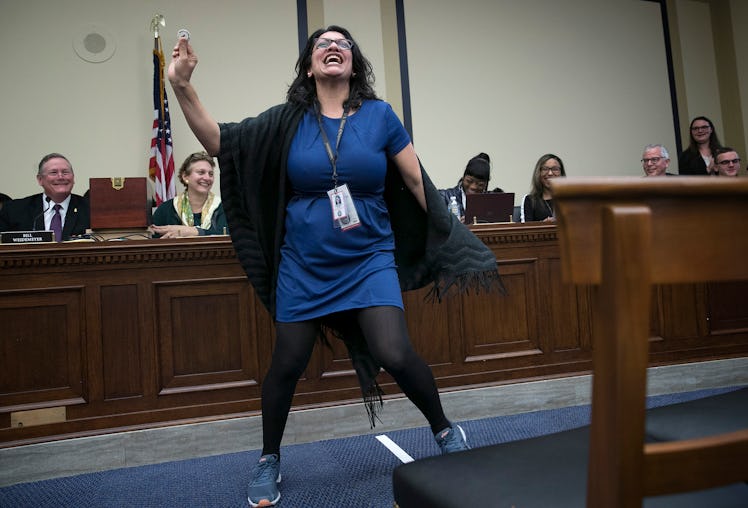
Rashida Tlaib's Traditional Palestinian Gown At Her Swearing-In Has People Cheering
The newly-elected women of Congress are not done piling on the history-making moments. The 2018 midterm elections saw some major groundbreaking victories, including Rashida Tlaib's win for Michigan's 13th District that made her the first Palestinian American woman to serve in Congress. To mark her truly trailblazing win, Rashida Tlaib wore a Palestinian thobe gown to be sworn into Congress on Jan. 3. What better way to mark a historic victory than by celebrating new cultural representation in Congress?
While what Congress members wore to their swearing-in ceremonies might not immediately seem to be relevant, members of the new 116th Congress are putting it on the radar as a way to represent the diversity coming into this 116th Congress. Back in December, Tlaib shared with her Instagram followers that she'd be wearing a traditional Palestinian gown, called a thobe, to her swearing in. "Sneak peek: This is what I am wearing when I am sworn into Congress. #PalestinianThobe #ForMyYama" (Arabic for "mother"), she wrote. Along with the "sneak peek" was a photo of the gorgeous gown: black with red embroidery down the front and arms. According to the Huffington Post, the design of the embroidery on a thobe indicates where its wearer is from.
Not only did Tlaib's Instagram rack up almost 11,000 likes and loads of comments, but it even inspired a hashtag. Twitter user Susan Darraj (who uses the handle @SusanDarraj) created #TweetYourThobe urging women to share pictures of themselves in their thobes. Check out all this fabulous style and celebration of culture!
In a Jan. 3 piece for Elle, Tlaib wrote how "overcome with joy" she was to see the #TweetYourThobe response to her Instagram. In that same piece, Tlaib also explained her choice to wear a thobe to the ceremony. She began by writing that throughout her political career people "embraced" her and her "Palestinian roots." Wearing the thobe, for her, is an "unapologetic display" of the American people. She wrote,
Throughout my career in public service, the residents I have had the privilege of fighting for have embraced who I am, especially my Palestinian roots. This is what I want to bring to the United States Congress, an unapologetic display of the fabric of the people in this country. This is why I decided to wear a thobe when I am sworn into the 116th Congress.
Not only did she choose to make a mark with her clothing, but she also encouraged others to do the same. In the Elle piece, posted on the day of her swearing in, she told supporters that they can choose to wear their favorite "activist shirt" on Jan. 3 to "show everyone who you, your heritage, and what you stand for." A pretty encouraging message as a new Congress takes the reins.
Tlaib's message and choice to wear the thobe is particularly relevant given that she's one of two first-ever Muslim women to serve in Congress — the other is Ilhan Omar who won Minnesota's 5th District in the midterms, who also made history by wearing a hijab on the House floor, the first member of Congress to do so. Overall, the incoming Congress is remarkably diverse — beyond Tlaib and Omar, the 116th Congress will also see the first Native American women to serve in the House (Sharice Davids and Deb Haaland), the first Black woman from Massachusetts (Ayanna Pressley), the youngest woman elected (29-year-old Alexandria Ocasio-Cortez), and more. What's more, there will be a record 126 women serving in Congress overall. Not too shabby.
It's all the more meaningful because Tlaib is entering Congress during an administration that has been criticized for its approach to the Muslim community. In 2017, Trump instituted a travel ban that affected primarily Muslim-majority countries, banning travelers from countries like Syria, Iran, and Libya. The ban went through multiple versions, and was struck down by the U.S. 9th Circuit in December 2017. That ruling was in turn reversed by the U.S. Supreme Court in April 2018, handing a major victory to the Trump administration. The administration — and Trump personally — has also often been criticized for what many have seen as Islamophobic or racially-loaded comments, including frequent association of Islam with terrorism and the promotion of false conspiracy theories that American Muslims celebrated the attacks on 9/11. Trump also said in March 2016 that "I think Islam hates us," during an interview with CNN. Elite Daily reached out to the White House for comment on each of these remarks, but did not immediately hear back.
Given the political climate for Muslims and immigrants, it's a powerful move for Tlaib to embrace her culture as she begins her tenure in Congress. Here's to diversity!